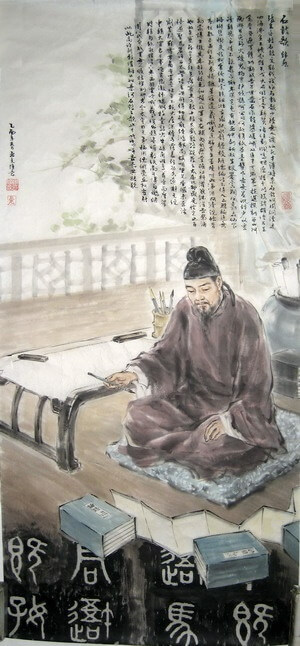A Poem on the Stone Drums
- Poetry of Han Yu

Chang handed me this tracing, from the stone drums,
Beseeching me to write a poem on the stone drums.
Du Fu has gone. Li Bai is dead.
What can my poor talent do for the stone drums?
...When the Zhou power waned and China was bubbling,
Emperor Xuan, up in wrath, waved his holy spear:
And opened his Great Audience, receiving all the tributes
Of kings and lords who came to him with a tune of clanging weapons.
They held a hunt in Qiyang and proved their marksmanship:
Fallen birds and animals were strewn three thousand miles.
And the exploit was recorded, to inform new generations....
Cut out of jutting cliffs, these drums made of stone-
On which poets and artisans, all of the first order,
Had indited and chiselled-were set in the deep mountains
To be washed by rain, baked by sun, burned by wildfire,
Eyed by evil spirits; and protected by the gods.
...Where can he have found the tracing on this paper? --
True to the original, not altered by a hair,
The meaning deep, the phrases cryptic, difficult to read.
And the style of the characters neither square nor tadpole.
Time has not yet vanquished the beauty of these letters --
Looking like sharp daggers that pierce live crocodiles,
Like phoenix-mates dancing, like angels hovering down,
Like trees of jade and coral with interlocking branches,
Like golden cord and iron chain tied together tight,
Like incense-tripods flung in the sea, like dragons mounting heaven.
Historians, gathering ancient poems, forgot to gather these,
To make the two Books of Musical Song more colourful and striking;
Confucius journeyed in the west, but not to the Qin Kingdom,
He chose our planet and our stars but missed the sun and moon
I who am fond of antiquity, was born too late
And, thinking of these wonderful things, cannot hold back my tears....
I remember, when I was awarded my highest degree,
During the first year of Yuanho,
How a friend of mine, then at the western camp,
Offered to assist me in removing these old relics.
I bathed and changed, then made my plea to the college president
And urged on him the rareness of these most precious things.
They could be wrapped in rugs, be packed and sent in boxes
And carried on only a few camels: ten stone drums
To grace the Imperial Temple like the Incense-Pot of Gao --
Or their lustre and their value would increase a hundredfold,
If the monarch would present them to the university,
Where students could study them and doubtless decipher them,
And multitudes, attracted to the capital of culture
Prom all corners of the Empire, would be quick to gather.
We could scour the moss, pick out the dirt, restore the original surface,
And lodge them in a fitting and secure place for ever,
Covered by a massive building with wide eaves
Where nothing more might happen to them as it had before.
...But government officials grow fixed in their ways
And never will initiate beyond old precedent;
So herd- boys strike the drums for fire, cows polish horns on them,
With no one to handle them reverentially.
Still ageing and decaying, soon they may be effaced.
Six years I have sighed for them, chanting toward the west....
The familiar script of Wang Xizhi, beautiful though it was,
Could be had, several pages, just for a few white geese,
But now, eight dynasties after the Zhou, and all the wars over,
Why should there be nobody caring for these drums?
The Empire is at peace, the government free.
Poets again are honoured and Confucians and Mencians....
Oh, how may this petition be carried to the throne?
It needs indeed an eloquent flow, like a cataract-
But, alas, my voice has broken, in my song of the stone drums,
To a sound of supplication choked with its own tears.
Seven-character-ancient-verse
This poem was composed in the 6th year of the Yuanhe era of Emperor Xianzong of Tang (811 AD), when Han Yu saw an early rubbing of the Stone Drum Inscriptions at Zhang Ji's place. Deeply moved by their value but pained by their long neglect, the poet wrote this poem to express his admiration for the inscriptions and to call for their preservation and study. The poem is filled with sorrow over the loss of cultural heritage and indignation toward the rulers.
张生手持石鼓文,劝我试作石鼓歌。
少陵无人谪仙死,才薄将奈石鼓何。
周纲凌迟四海沸,宣王愤起挥天戈。
大开明堂受朝贺,诸侯剑佩鸣相磨。
蒐于岐阳骋雄俊,万里禽兽皆遮罗。
镌功勒成告万世,凿石作鼓隳嵯峨。
从臣才艺咸第一,拣选撰刻留山阿。
雨淋日灸野火燎,鬼物守护烦撝呵。
公从何处得纸本,毫发尽备无差讹。
辞严义密读难晓,字体不类隶与蝌。
年深岂免有缺画,快剑斫断生蛟鼍。
鸾翔凤翥众仙下,珊瑚碧树交枝柯。
金绳铁索锁钮壮,古鼎跃水龙腾梭。
陋儒编诗不收入,二雅褊迫无委蛇。
孔子西行不到秦,掎摭星宿遗羲娥。
嗟余好古生苦晚,对此涕泪双滂沱。
忆昔初蒙博士征,其年始改称元和。
故人从军在右辅,为我度量掘臼科。
濯冠沐浴告祭酒,如此至宝存岂多。
毡包席裹可立致,十鼓只载数骆驼。
荐诸太庙比郜鼎,光价岂止百倍过。
圣恩若许留太学,诸生讲解得切磋。
观经鸿都尚填咽,坐见举国来奔波。
剜苔剔藓露节角,安置妥帖平不颇。
大厦深檐与盖覆,经历久远期无佗。
中朝大官老于事,讵肯感激徒媕婀。
牧童敲火牛砺角,谁复著手为摩挲。
日销月铄就埋没,六年西顾空吟哦。
羲之俗书趁姿媚,数纸尚可博白鹅。
继周八代争战罢,无人收拾理则那。
方今太平日无事,柄任儒术崇丘轲。
安能以此尚论列,愿借辩口如悬河。
石鼓之歌止于此,呜呼吾意其蹉跎。
- Why Chinese poems is so special?
- The most distinctive features of Chinese poetry are: concision- many poems are only four lines, and few are much longer than eight; ambiguity- number, tense and parts of speech are often undetermined, creating particularly rich interpretative possibilities; and structure- most poems follow quite strict formal patterns which have beauty in themselves as well as highlighting meaningful contrasts.
- How to read a Chinese poem?
- Like an English poem, but more so. Everything is there for a reason, so try to find that reason. Think about all the possible connotations, and be aware of the different possibilities of number and tense. Look for contrasts: within lines, between the lines of each couplet and between successive couplets. Above all, don't worry about what the poet meant- find your meaning.
- An Early Audience at the Palace of Light, Harmonizing Secretary Jia Zhi's Poem
- Farewell to a Japanese Monk
- Watching the Hunt
- The Lake Qi
- The Pepper Garden
- Mengcheng Mound
- A Boat in Spring on Jo-Ya Lake
- Night at Longxing Temple
- The Abbot’s Hut
- Passing by Monk Rong’s Hermitage